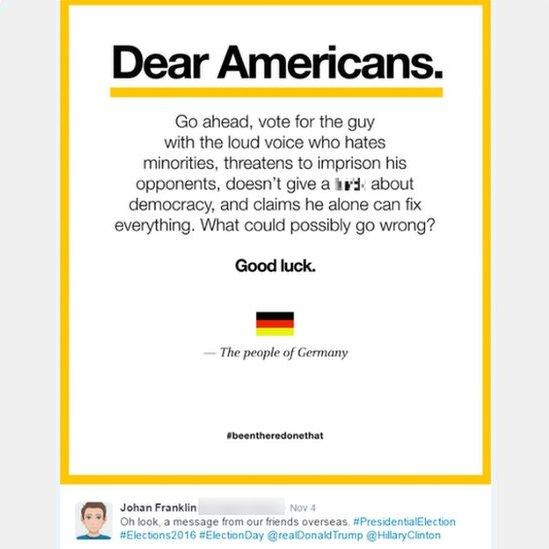A German Perspective on Trump’s Campaign
A recent social media post comparing Donald Trump’s presidential campaign to Adolf Hitler’s rise in the 1930s has sparked significant discussion, both in the U.S. and abroad. The individual behind the provocative comparison is Johan Franklin, a German citizen residing in San Diego, California.
On Friday, Franklin posted a message on Twitter directed at Americans from “the people of Germany,” questioning what could go wrong if they voted for “the guy with the loud voice” who “threatens to imprison his opponents.” His tweet, which included the viral hashtag #beentheredonethat, quickly gained traction, leading to a plethora of memes that drew parallels between Trump and Hitler. However, the comparison was not without backlash, as many criticized it for being overly inflammatory.
Defending the Comparison
In an interview with the BBC, Franklin acknowledged that the Hitler analogy was “pretty crude” but emphasized that it was not aimed specifically at Trump himself. He expressed concern about the alarming similarities he sees between Trump’s ability to rally supporters and the historical events he learned about from his grandparents regarding Nazi Germany.
“I got frightened when trying to talk to Trump supporters,” Franklin explained. “I began to notice disturbing parallels to what my grandparents told me about the events in Germany back in the 1930s.” His post gained further prominence after being shared by a supporter of Hillary Clinton, prompting Franklin to elaborate on his views in a follow-up message.
In this update, Franklin clarified, “Of course I can’t speak for the entire population of Germany. I used that signature line as a way of over-dramatizing to add emphasis.” He acknowledged the difficulty of equating Trump directly with Hitler but cited similarities in how they both gathered fervent followers amid troubling signs.
Mixed Reactions
Responses to Franklin’s tweet have been mixed. While some criticized him, with comments like, “Yeah, yeah, I know, I know; Trump is Hitler,” others recognized the validity of his concern. Mick Flugennock, for example, suggested that Franklin was overstepping by acting as a spokesperson for the German populace.
Supporters of Mrs. Clinton quickly shared Franklin’s message, encouraging others to heed his warning as the election approached. One user tweeted, “Listen to the Germans,” while another added a reminder about the historical significance of his message.
| Aspect | Franklin’s View |
|---|---|
| Comparison to Hitler | Not directly about Trump, but about rallying behind strong leaders amidst troubling signs. |
| Concern for America | Worry about the climate of hate during the U.S. presidential campaign. |
| Reactions to His Message | Received both criticism and supportive messages about the political climate. |
Cultural Reflections
Franklin, who has family roots in Germany, recounted how his grandparents lived with a sense of “German collective guilt,” feeling powerless to halt the Nazi movement once it gained momentum. He expressed his frustration at being asked how the German people could have supported Hitler, noting that such questions are now less common. This sentiment seems to highlight a fear that history could repeat itself if vigilance is not maintained.
As a father of young children, Franklin stated that his motivation for posting the letter was to stir conversation about the current state of political discourse in America. He acknowledged that his message may have little effect on staunch Trump supporters but found value in igniting a meaningful dialogue about the alarming trends he perceives. Despite facing online backlash, including threats, he expressed gratitude for the positive discussions his post has generated.

